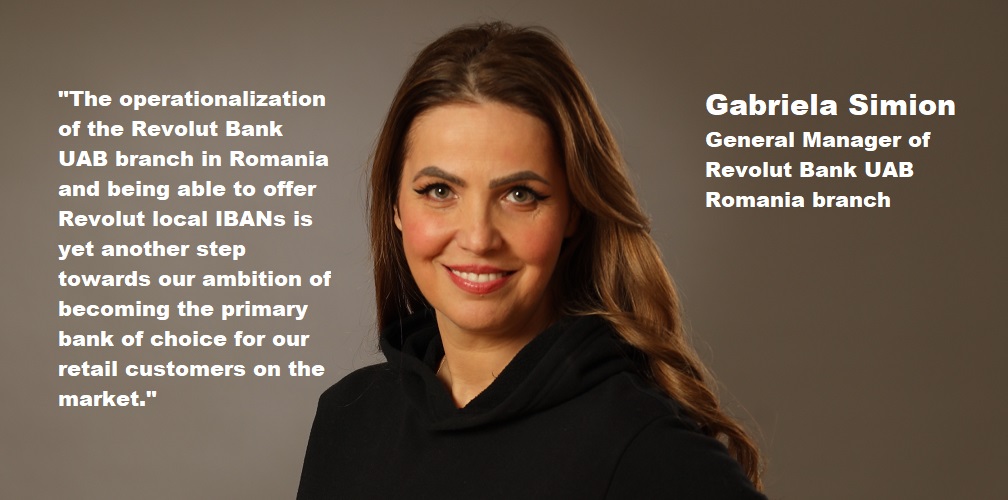The Romanian branch of Revolut Bank UAB will become officially active in December 2024. The company announcing the start of the staged rollout of its local Romanian IBANs, from the Lithuanian entity to the local branch.

.All Revolut accounts in Romania will be switched to Revolut local IBANs from the existing partner local IBANs. The process will be a staged roll-out until the end of the year and will enable Revolut to meet the specific needs of the local customers. Romania is the second largest market for Revolut, globally, by retail customer base and the first in the EU. In the last 12 months, Revolut opened local branches in Ireland, France, Spain, and the Netherlands.
Revolut Bank, the European digital bank with over 34 million customers in the EEA[1] and more than 4 million in Romania, is officially announcing the start of the staged rollout of its local Romanian IBANs, from the Lithuanian entity to the local branch. The process will take place throughout the last quarter of 2024.
Romania is the second largest market for Revolut, globally, by retail customer base and the first in the EU. In the last 12 months, Revolut opened local operations via branches in Ireland, France, Spain, and the Netherlands. The Romanian branch and other key markets will roll-out local IBANs provided by Revolut, by the end of the year. The local IBAN update will help Revolut to meet increasing financial needs of the Romanian customers, to continue the diversification of its banking products portfolio and cater in a more personalized way to the needs of the local clients.
In 2022, the bank initiated the regulatory steps for the establishment of a local Romanian branch, being registered in the National Bank of Romania’s „Branches of credit institutions from other member states” registry. The branch will start to operate effectively in December 2024, fully digital (no brick-and mortar presence). From that moment on, all accounts – existing and new – will be managed locally by the Romanian branch of Revolut Bank UAB. Customer deposits will continue to be covered up to €100,000 by the Lithuanian Deposit Guarantee Fund. Revolut Bank operates in 30 markets within the European Economic Area (EEA) and is licensed and regulated by the European Central Bank and the Bank of Lithuania.
Gabriela Simion, General Manager of Revolut Bank UAB Romania branch, commented: „The operationalization of the Revolut Bank UAB branch in Romania and being able to offer Revolut local IBANs is yet another step towards our ambition of becoming the primary bank of choice for our retail customers on the market. We put great emphasis on being locally relevant in every market in which we operate.
Our goal is to help our clients make the most of their finances, and to help them take more and better control of their money. Whether it’s their borrowing or spending preferences, whether they want to save it or invest, Revolut offers a whole ecosystem in its superapp, to centralize and optimize financial decisions, making the most of their money.”
Mariia Lukash – Head of Growth for CEE region at Revolut, explains: „We’ve evolved a lot over the last few years, quickly maturing our offering and moving from being the trusted travel card of our users to a complete ecosystem of financial innovations with a powerful banking products portfolio at the core of our offering. In a few clicks, our customers can rely on our app to virtually cover all their financial needs: from the most routine ones like paying day-to-day expenses, to the most exciting ones, like growing their money through savings or enjoying it to the fullest on travel and other experiences. Our growth pace is currently strong in Romania and our ambition is to continue this exponential growth path to become one of the leading primary accounts in the country soon.”
A local IBAN is often essential when choosing a bank as their main account, and the addition of the Romanian IBAN will make it easier for users to direct debit their paycheck and bills to their Revolut account. „This, coupled with the complete ecosystem of products offered by the superapp (daily banking, credit, savings, investment, budgeting, travel, experiences, lifestyle) positions Revolut as a solid alternative as a primary bank for the Romanians.” – the company said.
As in all products and services provided by Revolut, the migration will be smooth and frictionless, while the customer experience will remain unchanged. All services related to the payment accounts used by the customers (e.g. Personal Account, Paid Plans, Joint Accounts, Revolut Pro, local and cross-border direct debits and money transfers, currency exchange, card payments, Revolut <18 and Savings accounts) will be provided via the Romanian branch. All other services will continue to be provided from other entities in the way they’re provided today.
All existing customers will need to update their personal information as soon as possible, to continue to enjoy the same banking experience. Also, they will need to accept terms documents for the products they use, as the T&Cs will be aligned with Romanian law, which will now be applying and protecting customers. The clients will be informed directly in app and via emails about the steps to be performed.
__________
[1] As of Apr 30, 2024.
Dariusz Mazurkiewicz – CEO at BLIK Polish Payment Standard
Banking 4.0 – „how was the experience for you”
„To be honest I think that Sinaia, your conference, is much better then Davos.”
Many more interesting quotes in the video below:










